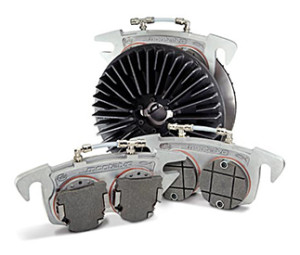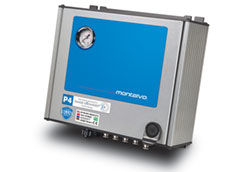Whether Manufacturers like to admit it or not, Pneumatic Brakes can experience brake noise. The good news is, Montalvo manufactures the highest quality Tension Brakes in the industry and so it is very rare, and as mentioned below can also come from other environmental factors. But as rare as it is, when Pneumatic Brakes produce noise, there are a few things you can do to reduce and often eliminate it.
In this article, we will go over a few tips that can help identify the cause and eliminate Brake Noise.
What causes Tension Brakes to squeal? As two components rub against one another, that contact can cause a vibration, which leads to the noise we hear. In the case of Tension Brakes, the two parts are the Friction Pads and the cast-iron disc surface. While in some cases the noise is not in an audible human range, the problem starts when it is.
Over the years Montalvo discovered that some customers experience Brake noise only in the winter months, while other customers only experience Brake noise while running specific processes, and most other customers never have Brake noise. For example, in the converting, paper, and packaging industries, the Tension Brakes run in a continuous slip manner, unlike other processes that run in a start-stop manner. This operational difference can increase the likelihood of Brake noise. In another example, an application can run perfectly for years without ever generating noise, and all of a sudden, the Brake starts to squeal.
When it comes to solving Brake noise, there are primarily two options to consider. One, eliminating the vibrations causing the noise. Or two, sound-dampening the Friction Pads themselves. It is possible to decrease the vibration and thus lower it enough so the human ear can’t hear it. Although Friction Pads receive most of the blame for Brake noise, there are other elements that to can cause a Brake System to squeal.
Choosing the Right Friction Pads
 Every application requires different Friction Pads depending on the specific needs of the process. Thus, every Friction Pad has its own characteristics to accommodate those needs such as different temperatures, stresses, and wearability requirements. But every Friction Pad has its limitations. Pads that offer quiet runs may wear much faster. On the other hand, pads that run at a much lower rate due to high coefficient levels tend to cause Brake noise since they don’t have the sound-dampening features other pads have. If experiencing Brake noise, one recommendation is to mix different types of Friction Pads with different coefficients level in the same Brake System to eliminate Brake noise. A Montalvo Applications Specialist can help you make this selection without losing any performance or torque requirements.
Every application requires different Friction Pads depending on the specific needs of the process. Thus, every Friction Pad has its own characteristics to accommodate those needs such as different temperatures, stresses, and wearability requirements. But every Friction Pad has its limitations. Pads that offer quiet runs may wear much faster. On the other hand, pads that run at a much lower rate due to high coefficient levels tend to cause Brake noise since they don’t have the sound-dampening features other pads have. If experiencing Brake noise, one recommendation is to mix different types of Friction Pads with different coefficients level in the same Brake System to eliminate Brake noise. A Montalvo Applications Specialist can help you make this selection without losing any performance or torque requirements.
One Teflon Pad is All You Need
 While there are several issues that can cause a Brake to squeal, one of the easiest fixes is simply replacing one of the Friction Pads with a Teflon Brake Pad. Teflon pads are made of friction material impregnated with a loading of Teflon. As the pad wears, a small amount of Teflon is deposited on the Brake rotor; this small amount of Teflon provides enough lubrication to eliminate the stick-release condition that is causing the vibration of the rotor and thus causes the Brake to squeal.
While there are several issues that can cause a Brake to squeal, one of the easiest fixes is simply replacing one of the Friction Pads with a Teflon Brake Pad. Teflon pads are made of friction material impregnated with a loading of Teflon. As the pad wears, a small amount of Teflon is deposited on the Brake rotor; this small amount of Teflon provides enough lubrication to eliminate the stick-release condition that is causing the vibration of the rotor and thus causes the Brake to squeal.
The Size of Your Brake Matters
While it is better to oversize Tension Brakes than to undersize, the Brake may run at a lower temperature than the optimal operating temperatures of 150°-200° F, thus the minimum may never be reached. Such a case could lead to Brake noise. Moreover, in a case where the Brake has a fan cover, the fan may reduce the temperature and thus cause the Brake to squeal. In that case, we recommend turning off the fan during those lower temperature runs.
Your Brake is Squealing for a Clean
 As friction material glazes on the Brake disc, it coats the surface of the disc, leaving behind small particles that accumulate with time. Those particles can cause the Brake to squeal. When changing Friction Pads it is important to clean the surface of the Brake disc and remove any friction particles that accumulate which may affect the characteristics of the new pads. When the Brake has cooled, use light grit sandpaper or preferably an emery cloth and rub in a circular motion while slowly rotating the disc (you can remove the Friction Modules if needed). You will immediately notice the cloth is now soiled to some degree. Repeat this until the cloth no longer picks up any visible particles. By cleaning the Brake, you can reduce Brake squeal.
As friction material glazes on the Brake disc, it coats the surface of the disc, leaving behind small particles that accumulate with time. Those particles can cause the Brake to squeal. When changing Friction Pads it is important to clean the surface of the Brake disc and remove any friction particles that accumulate which may affect the characteristics of the new pads. When the Brake has cooled, use light grit sandpaper or preferably an emery cloth and rub in a circular motion while slowly rotating the disc (you can remove the Friction Modules if needed). You will immediately notice the cloth is now soiled to some degree. Repeat this until the cloth no longer picks up any visible particles. By cleaning the Brake, you can reduce Brake squeal.
Precise Air Control
 When too little air pressure is applied to the Brake Pads it can allow the pads to chatter, which often produces the squealing noise. By adding a PDA Valve or Range Expander, the air pressure can be increased as a result of turning off some of the Brake Pads. This will eliminate the Brake noise by increasing the air pressure to the engaged Brake Pads, as it uses the same air pressure for fewer Brake Pads without sacrificing the amount of torque.
When too little air pressure is applied to the Brake Pads it can allow the pads to chatter, which often produces the squealing noise. By adding a PDA Valve or Range Expander, the air pressure can be increased as a result of turning off some of the Brake Pads. This will eliminate the Brake noise by increasing the air pressure to the engaged Brake Pads, as it uses the same air pressure for fewer Brake Pads without sacrificing the amount of torque.


